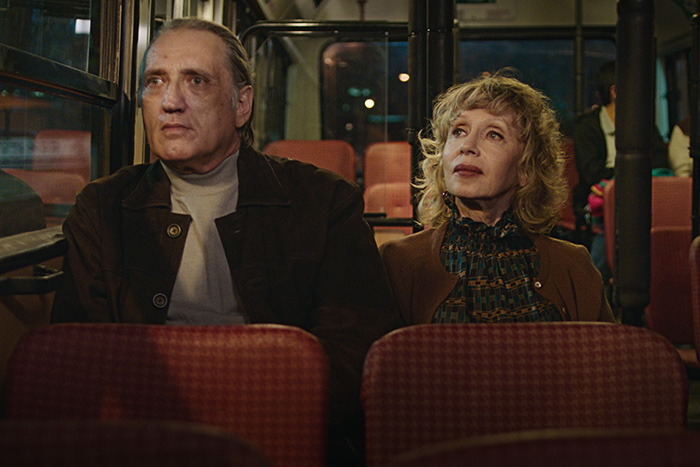
In Evgeny Ruman’s bittersweet new film, Golden Voices, a pair of aging voice actors find their lives in upheaval after immigrating to Israel from the former Soviet Union. Victor and Raya, (Vladimir Friedman and Maria Belkin), are not only in a new land with an altogether new language, but also at a crossroads in both career and marriage. The duo, once the premier voiceover actors in the Soviet Union for dubbing foreign films, find themselves bereft or purpose, and the seams in their relationship begin to show.
The story is set in 1990 during a massive wave of Russian Jewish immigration to Israel, a time when the country is also under a cloud of threat from Saddam Hussein’s Iraq. All citizens line up to receive gas masks to protect against a chemical weapon attack. Victor’s first job in Israel is pounding the pavement, putting up signs warning citizens of possible missile attacks. Raya finds employment as a telephone sex worker, chatting with horny, lonely Russian ex-pats. Victor thinks she is selling perfume.
It’s clear this was a seminal time for Ruman, who had immigrated to Israel with his parents around this time. He imbues the film with a rich sense of reminiscence and brings a warm, empathetic touch to his two lead characters, allowing them to anchor the screen and peel back the layers of these lost souls.
Vladimir Friedman plays his character as gruff, but wide-eyed: a passionate dreamer, refusing to let go of who he was, unwilling to move on. In a show-stealing role, Maria Belkin gives us a Raya who is a charming and hopeful foil to her husband, willing to do whatever it takes and ready to wear her heart of her sleeve if it means making the most of their new life. Their opposing impulses will lead them down diverging paths.
Faced with jobs that are a far cry from their former lives as superstar voice actors, the two have only their talents to fall back on. Raya isn’t just any phone sex operator, she’s the consummate professional, alternating between girlish youth and husky matron, empathetic listener and virginal tease.
Victor goes back to doing what he does best: dubbing tape. He soon finds himself working with an underground video store that pirates American movies, then dubs them for the swelling immigrant Russian population. Even here, on the wrong side of the law, Victor insists on watching the movies as the recording is being made, giving him an opportunity to refine his performance, to be his best.
Raya and Victor give everything to their new roles. At home, however, neither is able to muster the same enthusiasm for each other. Ruman seems to be asking: If we lose everything, our country, our language, our jobs, what kind of identity is left to fall back on? And how can a marriage survive if the people inhabiting it can no longer recognize themselves, let alone each other?
The pat answer would be that over the centuries, the Jewish people have always been part of the diaspora. Moving from one place to another is part and parcel of being Jewish. Leaning on Judaism in times like these would be the only way to keep from falling apart. However, if religious observance is important to Raya and Victor, Ruman never shows it. What emerges instead is a love of acting, craft and especially the movies. The director has indicated that after he moved to Israel, one of the few things that brought him pleasure was watching illegal tapes of American movies dubbed in Russian. In his mind, the movies, like religion, binds people together; and it is what will eventually return Raya and Victor into each other’s orbit.
Golden Voices is a sweet, sad, funny film about moving on, rooted in a unique and little explored time in Israeli history. It asks us to consider that when left with nothing, what keeps us going? What keeps us alive? For Raya and Victor, their life is in the cinema, and nothing, not jail, not even a few Scud missiles, will keep them away.
In Hebrew and Russian with English subtitles. Opens in New York and Los Angeles on October 8th.
Related Posts

The Art of Wisdom: Proverbs, Adages, and Maxims, and the Images They Inspire

Wearing Strength: Jewelry as a Symbol of Jewish Resilience

